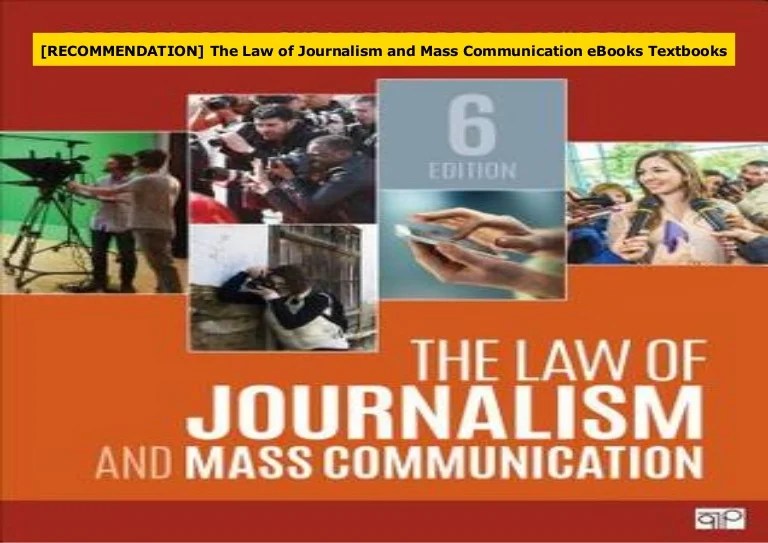The law of journalism and mass communication 7th edition – The Law of Journalism and Mass Communication, 7th Edition embarks on an engrossing journey into the intricate world of media law, providing a comprehensive analysis of the fundamental principles, historical evolution, and emerging challenges shaping this dynamic field.
This seminal work delves into the heart of freedom of expression, privacy rights, media ownership, and regulation, offering a nuanced understanding of the legal framework governing journalism and mass communication.
1. Key Concepts and Foundations

Journalism and mass communication are fundamental to a democratic society, providing information and facilitating public discourse. They are governed by ethical principles and legal frameworks that protect freedom of expression and the public’s right to know.
The historical evolution of journalism and mass communication laws has shaped the current legal landscape, with significant milestones including the development of libel and slander laws, the establishment of the First Amendment, and the regulation of broadcasting.
s:, The law of journalism and mass communication 7th edition
- Fundamental principles and ethics of journalism and mass communication
- Historical evolution and development of journalism and mass communication laws
2. Freedom of Expression and the First Amendment

The First Amendment of the US Constitution provides strong protections for freedom of speech and press. These protections extend to journalism and mass communication, ensuring that the public has access to a wide range of information and perspectives.
However, the First Amendment does have some exceptions, such as libel, slander, and obscenity. These exceptions balance the public’s right to know with the need to protect individuals from harm.
s:, The law of journalism and mass communication 7th edition
- First Amendment’s protections for freedom of speech and press
- Exceptions to First Amendment protections: libel, slander, obscenity
3. Privacy Rights and Media Law
The legal framework governing privacy rights and media law balances the public’s right to know with the need to protect individuals from the dissemination of personal information without their consent.
Laws governing the collection, use, and dissemination of personal information by media outlets aim to prevent the invasion of privacy and protect individuals from harm.
s:, The law of journalism and mass communication 7th edition
- Legal protections for privacy
- Media’s role in balancing privacy concerns with the public’s right to know
- Laws governing the collection, use, and dissemination of personal information
4. Media Ownership and Regulation: The Law Of Journalism And Mass Communication 7th Edition
The legal framework governing media ownership and regulation aims to prevent monopolies and promote diversity of voices in the media landscape.
The Federal Communications Commission (FCC) and other regulatory bodies play a crucial role in regulating the media industry, ensuring fair competition and protecting the public interest.
s:, The law of journalism and mass communication 7th edition
- Legal framework governing media ownership and consolidation
- Role of the FCC and other regulatory bodies in regulating the media industry
5. Emerging Issues in Journalism and Mass Communication Law

The digital age has brought forth new legal challenges in journalism and mass communication, including online defamation, privacy concerns in social media, and the regulation of artificial intelligence in journalism.
The impact of technology on the legal landscape of journalism and mass communication is constantly evolving, requiring ongoing analysis and adaptation of the legal framework.
s:, The law of journalism and mass communication 7th edition
- Emerging legal challenges in the digital age: online defamation, privacy concerns in social media, regulation of AI in journalism
- Impact of technology on the legal landscape of journalism and mass communication
FAQ Summary
What are the key principles of journalism ethics?
Accuracy, objectivity, fairness, and accountability are among the core principles of journalism ethics.
How does the First Amendment protect freedom of the press?
The First Amendment of the US Constitution guarantees the freedom of the press, protecting journalists from government censorship and prosecution for publishing truthful information.
What are the legal limits on the media’s right to gather and disseminate information?
The media’s right to gather and disseminate information is subject to certain legal limits, such as laws against libel, slander, and obscenity.
How has technology impacted the legal landscape of journalism?
Technology has brought about new challenges and opportunities for journalism, leading to the emergence of online defamation, privacy concerns in social media, and the regulation of artificial intelligence in journalism.